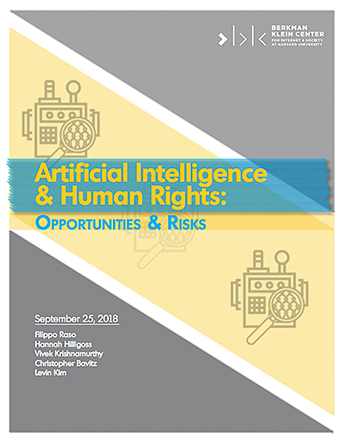Evaluating the impact of artificial intelligence on human rights — from today.law.harvard.edu by Carolyn Schmitt
Report from Berkman Klein Center for Internet & Society provides new foundational framework for considering risks and benefits of AI on human rights
Excerpt:
From using artificial intelligence (AI) to determine credit scores to using AI to determine whether a defendant or criminal may offend again, AI-based tools are increasingly being used by people and organizations in positions of authority to make important, often life-altering decisions. But how do these instances impact human rights, such as the right to equality before the law, and the right to an education?
A new report from the Berkman Klein Center for Internet & Society (BKC) addresses this issue and weighs the positive and negative impacts of AI on human rights through six “use cases” of algorithmic decision-making systems, including criminal justice risk assessments and credit scores. Whereas many other reports and studies have focused on ethical issues of AI, the BKC report is one of the first efforts to analyze the impacts of AI through a human rights lens, and proposes a new framework for thinking about the impact of AI on human rights. The report was funded, in part, by the Digital Inclusion Lab at Global Affairs Canada.
“One of the things I liked a lot about this project and about a lot of the work we’re doing [in the Algorithms and Justice track of the Ethics and Governance of AI Initiative] is that it’s extremely current and tangible. There are a lot of far-off science fiction scenarios that we’re trying to think about, but there’s also stuff happening right now,” says Professor Christopher Bavitz, the WilmerHale Clinical Professor of Law, Managing Director of the Cyberlaw Clinic at BKC, and senior author on the report. Bavitz also leads the Algorithms and Justice track of the BKC project on the Ethics and Governance of AI Initiative, which developed this report.
Also see:
- Morality in the Machines — from today.law.harvard.edu by Erick Trickey
Researchers at Harvard’s Berkman Klein Center for Internet & Society are collaborating with MIT scholars to study driverless cars, social media feeds, and criminal justice algorithms, to make sure openness and ethics inform artificial intelligence.









